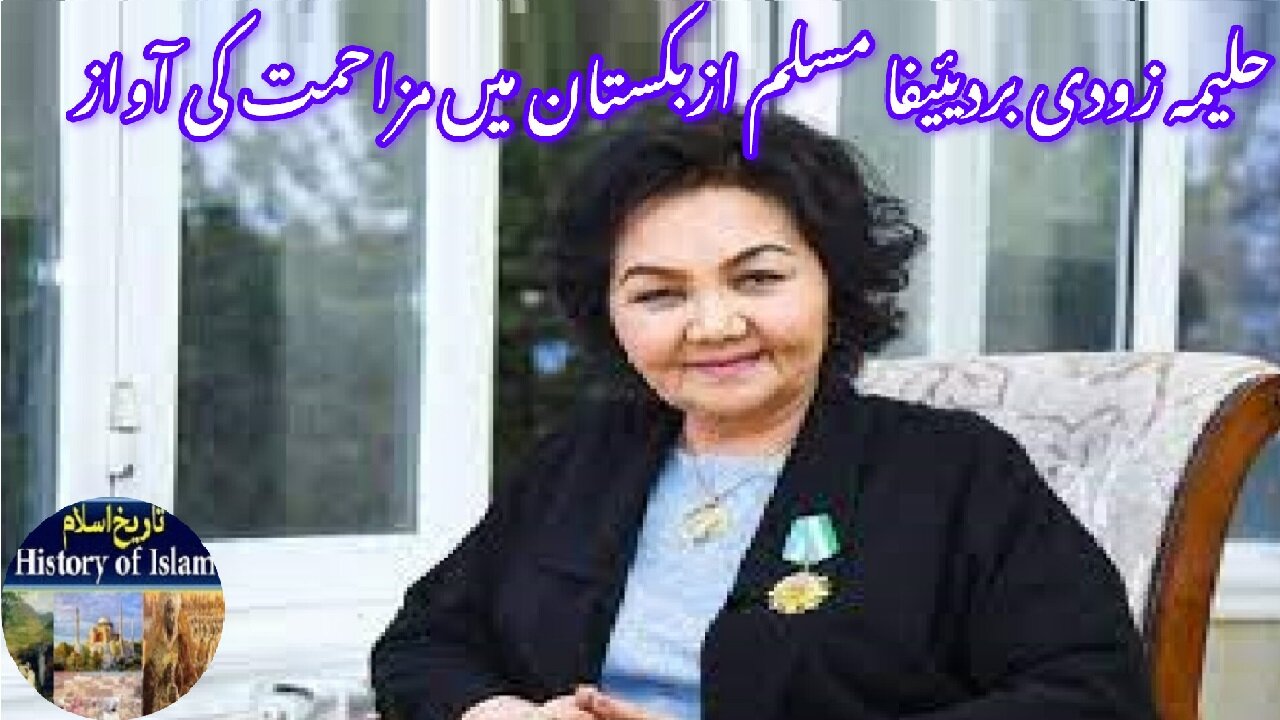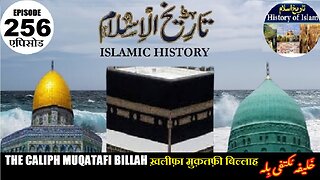Premium Only Content

Halima Xudoyberdiyeva of Uzbekistan حلیمہ زودی بردیئیفا ازبکستان میں مزاحمت کی آواز
@islamichistory813 #halimaxudoyberdiyeva #uzbekpoet #muslimwomenwarriors #islamichistory #uzbekistanhistory
Halima Xudoyberdiyeva Voice of Resistance in Muslim Uzbekistan
In the name of Allah, the Most Merciful, the Most Compassionate.
Welcome dear viewers to another inspiring episode on our channel, where we bring to life the forgotten and powerful stories of Muslim heroes. Today is Saturday, and as you know, we dedicate every Saturday to honor the legacy of Muslim women warriors and leaders. These are the remarkable women who fought not only with the sword on the battlefield, but also with their words, their wisdom, and their courage, leaving behind an everlasting impact on the Muslim Ummah.
This Saturday, we bring you the story of a woman whose strength did not come from weapons, but from her pen and her unshakable spirit. Halima Xudoyberdiyeva, the beloved daughter of Uzbekistan, is remembered as a poet, activist, and a symbol of resistance for her people. At a time when voices of truth were silenced, she rose with her verses, reminding the Muslim world that resistance is not always on the battlefield. Sometimes it is through the pen, through poetry, and through the power of words that nations find strength.
Halima Xudoyberdiyeva’s poetry carried the fragrance of faith, the pride of her homeland, and the dignity of Muslim women. She inspired generations to value their culture, their religion, and their independence. In her, we see a warrior of thought, a defender of heritage, and a voice of Islamic resilience.
Halima Xudoyberdiyeva was born on 17 May 1947 in the “Taraqqiyot” collective farm in Boyovut District, Sirdaryo Region, in what was then the Uzbek Soviet Socialist Republic. Her father was Ummatqul Xudoyberdi and her mother was Shafoat Konnazar (or Xonnazar) qizi. When she was about two years old she lost her mother, and thereafter she was raised by her aunt (halasi), Qarshigul Xonnazar qizi, who had great influence on her upbringing.
From her earliest years she showed a sensitivity to language, storytelling, and poetry. She attended local schools and after finishing secondary education she proceeded to higher studies. Between 1968 and 1972 she studied journalism at Tashkent State University (now Uzbekistan National University). After graduating she worked as a literary editor and in various editorial positions. Later, from 1975-1977, she pursued advanced literary studies at the Maxim Gorky Literature Institute in Moscow.
Halima’s early poetic talent manifested itself while she was still a student. Her first poems were published in the Yangiyer district newspaper in 1964. Her first book of poetry, Ilk Muhabbat (First Love), appeared in 1968 while she was still at university. After that came a steady stream of collections: Oq Olmalar (White Apples, 1973), Chaman (Flower Garden, 1974), Suyanch Tog‘larim (My Supporting Mountains, 1976), Bobo Quyosh (Grandfather Sun, 1977), Issiq Qor (Hot Snow, 1979), Sadoqat (Loyalty, 1983), Muqaddas Ayol (Sacred Woman, 1987), Bu Kunlarga Yetganlar Bor (There Are Those Who Have Lived To These Days, 1993), To’marisning Ayitgani (What Tomyris Said, 1996), and later Yo’ldadirman (I Am On The Road, 2005), among others.
Besides her work as a poet, Halima Xudoyberdiyeva held several important editorial and organizational roles. She began her career in the journal Saodat in 1972 as a department head. She then served in the youth publishing house Yosh Gvardiya (Youth Guard), moved up to deputy editor and editor in chief positions at Saodat, and held other editorial roles in various magazines and publishing houses.
Importantly, after Uzbekistan’s independence in 1991 she became the first president of the Women’s Committee of Uzbekistan, serving from 1991 to 1994. Through this role she advocated for women’s rights, national culture, and the inclusion of women in public life. Her poetry often addressed themes of national identity, history, feminism, liberation, and the condition of women.
Halima Xudoyberdiyeva’s achievements are many and span literary, national, and symbolic spheres. Here are the highlights:
In 1984, she was awarded the Order of the Badge of Honour (a Soviet-era honor) for her contributions to literature.
In 1990, she received the State Hamza Prize, another important Uzbek literary award.
In 1992, she was given the prestigious title People’s Poet of Uzbekistan (O‘zbekiston Xalq Shoiri), recognizing her as one of the foremost poets of her country.
In 2017, in celebration of her 70th birthday, she was awarded the Order of El-Yurt Hurmati (Respect of the Homeland), a high state honor recognizing her life’s work and service to Uzbek culture.
Her literary style combined lyricism, symbolic imagery, national sentiment, feminist voice, and a sense of cultural memory. She was not a battlefield warrior but she resisted by preserving language, exposing injustice, giving voice to women’s inner lives, and helping to shape national consciousness. Her poem Muqaddas Ayol (Sacred Woman) is especially celebrated as a feminist poem, giving dignity, spiritual dimension, and moral strength to the figure of a woman in society.
Halima Xudoyberdiyeva passed away on 17 August 2018 in Tashkent, Uzbekistan. At the time of her passing she was 71 years old. Her death was widely mourned by the Uzbek literary community, the state, and by readers throughout the country.
Halima’s life is an example of a modern form of resistance among Muslim women — not through physical combat, but through the pen, through culture, through raising consciousness. She used her poetry to resist colonial and post-colonial cultural erosion, to assert Uzbek identity, to speak about women’s rights, social justice, and a dignity of spiritual being. In many ways, she represents the tradition of Muslim women as moral, intellectual, cultural warriors.
Her role as the first president of the Women’s Committee in the early years after independence placed her in a position of organization and advocacy, enabling women’s voices in policy, culture, and public life. She bridged the Soviet era and the independent Uzbek cultural revival.
Her works have been translated into several foreign languages, broadening her influence beyond Uzbekistan. Her poems remain beloved in schools, among literary circles, and among ordinary people who find in them hope, pride, and remembrance. She has a number of publications, essays, public articles in addition to poetry.
Unlike many historic figures, there is no verified shrine associated with Halima Xudoyberdiyeva in the sense of a tomb that is venerated or a shrine complex. She was buried, but in her case public remembrance has taken more of the form of schools, institutions, and memorials rather than religious pilgrim sites.
For example, in 2019 on 19 February in the city of Guliston (in Sirdaryo region), a creative (ijod) school named after Halima Xudoyberdiyeva was established. At that opening, her bust or statue was also unveiled in the school grounds to honor her memory.
These memorials signal respect, remembrance, and cultural legacy rather than religious shrine status. Her works are taught, remembered, celebrated, and serve as moral vision for women’s inclusion, national pride, spiritual values, and artistic integrity.
Halima Xudoyberdiyeva stands as a beacon of modern symbolic resistance. Her strength was in her words, her courage in speaking truth, her battlefield was literature, culture, and the heart. She remains an exemplary Muslim woman: faithful, creative, resistant, compassionate. Though she did not lead armies, she inspired millions, especially women, to see that resistance need not always be physical; that preserving identity, giving voice to injustice, affirming history, and upholding dignity are also formidable struggle.
Her memory lives on in her poems, in institutions that bear her name, in her impact on generations of Uzbek women and men who see in her work a model of integrity. Her life confirms that the role of women in shaping nations, in defending culture, in bringing spiritual values into public conversation, is no less sacred or powerful than many more visible forms of resistance.
With this, we ask for your permission until tomorrow and tomorrow we will narrate biography of Sharaf al Din al Tusi. we will also narrate the history of her shrine. Finally, we pray to Allah Almighty to grant us the ability to act on the Quran and Hadith, Amen.
Allah Hafiz
#womenofislam #islamicresistance #islamicpoetry #heroesofislam #muslimwomenleaders #islamicbiography #muslimheritage #inspiringmuslimwomen #islamiccourage #muslimhistory #muslimahstrength #islamicculture #islamicfreedom #muslimwomenvoice #islamiclegacy #uzbekculture #islamicwarriorwomen #musliminspiration #islamicpride #islamicchannel
==================================
-
 9:23
9:23
ISLAMIC HISTORY
9 hours agoIslamic History Episode 256 The Caliph Muqatafi Billah ख़लीफ़ा मुक़तफ़ी बिल्लाह خلیفہ مکتفی بلہ
-
 1:11:30
1:11:30
Turning Point USA
3 hours agoCharlie Kirk Receives The Medal of Freedom at The White House | 10.14.2025
154K58 -
 LIVE
LIVE
SpartakusLIVE
30 minutes agoLIVE from SUPER SECRET, VIP Location || BEACH FRONT into Verdansk
352 watching -
 UPCOMING
UPCOMING
Mally_Mouse
7 hours ago📣Telescreen Talks - LIVE!
302 -
 1:06:24
1:06:24
TheCrucible
2 hours agoThe Extravaganza! EP: 53 with guest co-host Rob Noerr (10/14/25)
12.8K13 -
 1:31:12
1:31:12
Kim Iversen
2 hours agoMAYDAY! America’s Food System Is Collapsing — And Trump Thinks CHINA Will SAVE Us?
20.5K54 -
 LIVE
LIVE
StoneMountain64
5 hours agoBattlefield 6 Sniping and Unlocking SNIPERS from LONG RANGE
96 watching -
 LIVE
LIVE
GritsGG
44 minutes agoSolos! Most Wins in WORLD! 3734+!
44 watching -
 3:59:54
3:59:54
Right Side Broadcasting Network
6 hours agoLIVE REPLAY: President Trump Participates in the Charlie Kirk Medal of Freedom Ceremony - 10/14/25
117K33 -
 1:05:00
1:05:00
Dr. Drew
5 hours agoLetitia James Just Found Out "No One Is Above The Law" In Spectacular Display Of FAFO w/ Viva Frei – Ask Dr. Drew
43.1K18